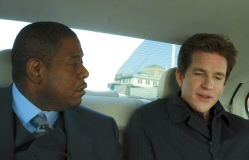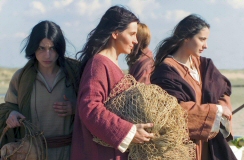Mary (Abel Ferrara, 2005)
 A serious-minded film from director Abel Ferrara about the confusion and anxiety
that mark a true inquisition into one’s faith, Mary certainly upends
itself in its quest to capture that disquiet. After several movies that dealt
with a character’s allegorical quest toward faith, here Ferrara grabs the bull
by the horns and makes his most explicitly spiritual work to date. Set in
distinctly modern times, this film features Juliette Binoche as Marie, an
actress who has become so subsumed in her role as Mary Magdalene that she finds
herself unable to return to her home when her film shoot is over. With the bulk
of a plot taking place a year after the shoot has ended, most of the action is
transposed to Ferrara’s native New York City, where viewers are introduced to
Ted Younger (Forest Whitaker), a television talk show host. His program deals
explicitly with issues of faith, yet his immersion in the media culture
surrounding religion has done little to prepare him for a bona fide spiritual
crisis. His communications with Marie, still abroad on her pilgrimage a year
later, present the script’s most explicit questioning of religious matters.
A serious-minded film from director Abel Ferrara about the confusion and anxiety
that mark a true inquisition into one’s faith, Mary certainly upends
itself in its quest to capture that disquiet. After several movies that dealt
with a character’s allegorical quest toward faith, here Ferrara grabs the bull
by the horns and makes his most explicitly spiritual work to date. Set in
distinctly modern times, this film features Juliette Binoche as Marie, an
actress who has become so subsumed in her role as Mary Magdalene that she finds
herself unable to return to her home when her film shoot is over. With the bulk
of a plot taking place a year after the shoot has ended, most of the action is
transposed to Ferrara’s native New York City, where viewers are introduced to
Ted Younger (Forest Whitaker), a television talk show host. His program deals
explicitly with issues of faith, yet his immersion in the media culture
surrounding religion has done little to prepare him for a bona fide spiritual
crisis. His communications with Marie, still abroad on her pilgrimage a year
later, present the script’s most explicit questioning of religious matters.
 Especially good here is the way that during the film the
audience’s attitude toward Binoche’s character is allowed to shift. At the
film’s start, she’s playing Magdalene, the disciple who might have in fact
been closest to Jesus, but she quickly become difficult to relate to in her
consuming passion. Other characters, like the audience, consider her to be mad,
but as the film progresses, her calm is restored, even if her normalcy is not,
and her conviction becomes a source of solace when everything else seems to have
gone insane. Her unquestioning devotion to her faith is a slap in the face to
the notion that our questioning of religious issues should be limited by
arbitrary, commercially imposed limits such as a thirty minute television time
slot or the two hour run time of a film. Mary stresses her assertion that
the complete transformation into a spiritual being, as she says, “takes
courage.” It’s not something that you can simply buy or glean quickly from
sound bites.
Especially good here is the way that during the film the
audience’s attitude toward Binoche’s character is allowed to shift. At the
film’s start, she’s playing Magdalene, the disciple who might have in fact
been closest to Jesus, but she quickly become difficult to relate to in her
consuming passion. Other characters, like the audience, consider her to be mad,
but as the film progresses, her calm is restored, even if her normalcy is not,
and her conviction becomes a source of solace when everything else seems to have
gone insane. Her unquestioning devotion to her faith is a slap in the face to
the notion that our questioning of religious issues should be limited by
arbitrary, commercially imposed limits such as a thirty minute television time
slot or the two hour run time of a film. Mary stresses her assertion that
the complete transformation into a spiritual being, as she says, “takes
courage.” It’s not something that you can simply buy or glean quickly from
sound bites.
 More than most religious films, Mary underlines this
idea of pure devotion as a scary, all-consuming state to those who haven’t yet
taken the plunge. Theologians talk throughout the film about religion in
theoretical terms, but when a crisis prompts Whittaker’s character to undergo
a soul-searching inquisition, he abandons the theoretical and is shaken to his
core. That anxiety makes this confused movie the perfect response to the media
frenzy that surrounded Mel Gibson’s movie last year (indeed, Matthew Modine
plays a role as a Gibson-like director who callously exploits faith and
controversy for profit, though his crisis remains secondary). Ferrara’s
aggressive style makes this fear palpable, giving the scary notion that one must
surrender oneself to be given to God visual representation. This is a work of
style over substance with its dazzling, intense last half-hour the clear
standout. Throughout, the director uses his typical scenes of random violence to
prompt a search for meaning. With his usual theatrical lighting and his slightly
dreamy backdrops, he intensifies the sense of rising theological doubt that
clouds his protagonist’s mind. Mary is a film that imparts a remarkable
sense of importance to its characters’ spiritual progression to those viewers
willing to shake its admittedly heavy hand.
More than most religious films, Mary underlines this
idea of pure devotion as a scary, all-consuming state to those who haven’t yet
taken the plunge. Theologians talk throughout the film about religion in
theoretical terms, but when a crisis prompts Whittaker’s character to undergo
a soul-searching inquisition, he abandons the theoretical and is shaken to his
core. That anxiety makes this confused movie the perfect response to the media
frenzy that surrounded Mel Gibson’s movie last year (indeed, Matthew Modine
plays a role as a Gibson-like director who callously exploits faith and
controversy for profit, though his crisis remains secondary). Ferrara’s
aggressive style makes this fear palpable, giving the scary notion that one must
surrender oneself to be given to God visual representation. This is a work of
style over substance with its dazzling, intense last half-hour the clear
standout. Throughout, the director uses his typical scenes of random violence to
prompt a search for meaning. With his usual theatrical lighting and his slightly
dreamy backdrops, he intensifies the sense of rising theological doubt that
clouds his protagonist’s mind. Mary is a film that imparts a remarkable
sense of importance to its characters’ spiritual progression to those viewers
willing to shake its admittedly heavy hand.
67
09.20.05
Jeremy Heilman